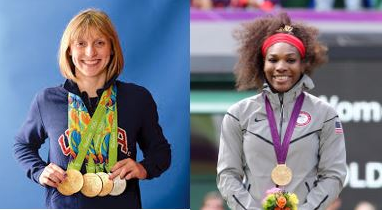Modern Sexism in Sports

Above is a photo of Katie Ledecky (left) and Serena Williams (right). Both are esteemed athletes but have faced incidentes of sexism throughout their careers.
September 21, 2018
Serena Williams’ recent involvement in the U.S. Open women’s tennis final has left many critics, fans and athletes claiming that sexism still has a vital impact in the outcome of sports. However, Williams’ recent defeat is not the only incident that has reignited this controversy. Other athletes such as Olympic swimmer Katie Ledecky support Williams’ claim that gender has an impact on sports. This controversy extends to all sport outlets, including grade school sports. Even at North Forsyth High School, students feel differences in sports based on gender.
On Saturday, Sept. 8, the umpire at the U.S. Open women’s tennis finals, Carlos Ramos, gave Williams a warning because her coach was supposedly coaching from the stands. The incident proceeded, with Williams’ denying claims of cheating and ultimately breaking her racket in frustration, which earned her another penalty. Other athletes and spectators found fault with Ramos, not Williams. While Williams lost the match, she did not bow down without making a statement to the press, calling out the umpire for sexism against her.
“He’s never taken a game from a man … But I’m going to continue to fight for women.”
During the 2016 Summer Olympics in Rio De Janeiro, gold medalist Katie Ledecky’s strokes were characterized to be “like a guy[’s].” Ryan Lochte, another swimmer at the Olympics, reported in an interview with Sports Illustrated that, “I’ve never seen a female swimmer like that. She gets faster every time she gets in, and her times are becoming good for a guy. She’s beating me now, and I’m, like, ‘What is going on?’” Ledecky’s fans and supporters, as well as other athletes, immediately spoke out against Lochte’s opinion. They felt that Ledecky should praised not for swimming like a man, but for excelling at swimming as herself.
Incidents of sexism in sports are unfortunately so common that they often seep into school systems as well. Students at North Forsyth High School also believe that certain sports are favored more than others because of gender. Senior Alyssa Marie Reyes says, “There are a lot of people who like going to all the boys’ sports. People think they are more exciting and then completely forget that girls have sports teams too.” At North, event attendance for female sports is consistently lower than attendance for male sports.
Sports, corporate businesses, technology, healthcare and even the music business all have their own statistics to support that there are gender differences in their industries. While the 21st century is paving a road of opportunity for all people, regardless of gender or anything else, there still remains both unintentional and intentional sexism in all manner of careers.



